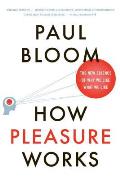“The origin of an object makes a profound difference”
From Steven Knapp’s remarks on “The Enduring Dilemma of the Humanities” at a symposium in March:
In February 2010 I wrote about author Ben Mezrich’s statement that “The idea that the story is true is more important than being able to prove that it’s true.” That’s because the idea of truth affects how we take in the story more than any proof we haven’t assessed.
On being similarly questioned about details in The Accidental Billionaires, Mezrich told Reuters: “It’s a nonfiction book. It’s a true story. I am a narrative nonfiction writer in a way that other people don’t write. I’m trying to create my own genre of nonfiction.” That book is the basis for the movie The Social Network, which many people have the idea is true.
Why, [Paul] Bloom asks [in How Pleasure Works], should we care so much about the origin of a forged work of art if the aesthetic features of that forgery are, as far as we can tell, just as good as those of an unforged original?I think the same factor is at work in how we read fiction differently from nonfiction. A story that seemed moving when people thought it was nonfiction—James Frey’s A Million Little Pieces—turned out to be shallow and thoroughly unbelievable when revealed as fiction. And so for the many other recent examples of fake memoirs, and even fake autobiographical fiction.
It turns out that the origin of an object makes a profound difference to human beings, and according to Bloom, that difference is built into the way we relate to the objects around us. Bloom regards this human disposition as a kind of innate essentialism in the human psyche: We automatically and involuntarily see objects as connected with their histories in ways that transcend their physical and aesthetic properties.
That’s why it matters to us whether an image was created on purpose or by accident, and that’s why we care more about what a picture was intended to represent than we care about what it actually looks like. Hence Bloom reports on “a series of studies that found that even three-year-olds would name their pictures based on what they were intending when they created it.” One investigator found that “even 24-month-olds are sensitive to a drawing’s history when deciding what to call it.”
What these studies point to, it seems to me, is the inseparability of our notion of particularity from our notion of history. What differentiates one object from another, from the point of view of human interest and value, is not what it looks like but where it came from, how it came to be, what it was intended to do or mean.
In February 2010 I wrote about author Ben Mezrich’s statement that “The idea that the story is true is more important than being able to prove that it’s true.” That’s because the idea of truth affects how we take in the story more than any proof we haven’t assessed.
On being similarly questioned about details in The Accidental Billionaires, Mezrich told Reuters: “It’s a nonfiction book. It’s a true story. I am a narrative nonfiction writer in a way that other people don’t write. I’m trying to create my own genre of nonfiction.” That book is the basis for the movie The Social Network, which many people have the idea is true.



No comments:
Post a Comment